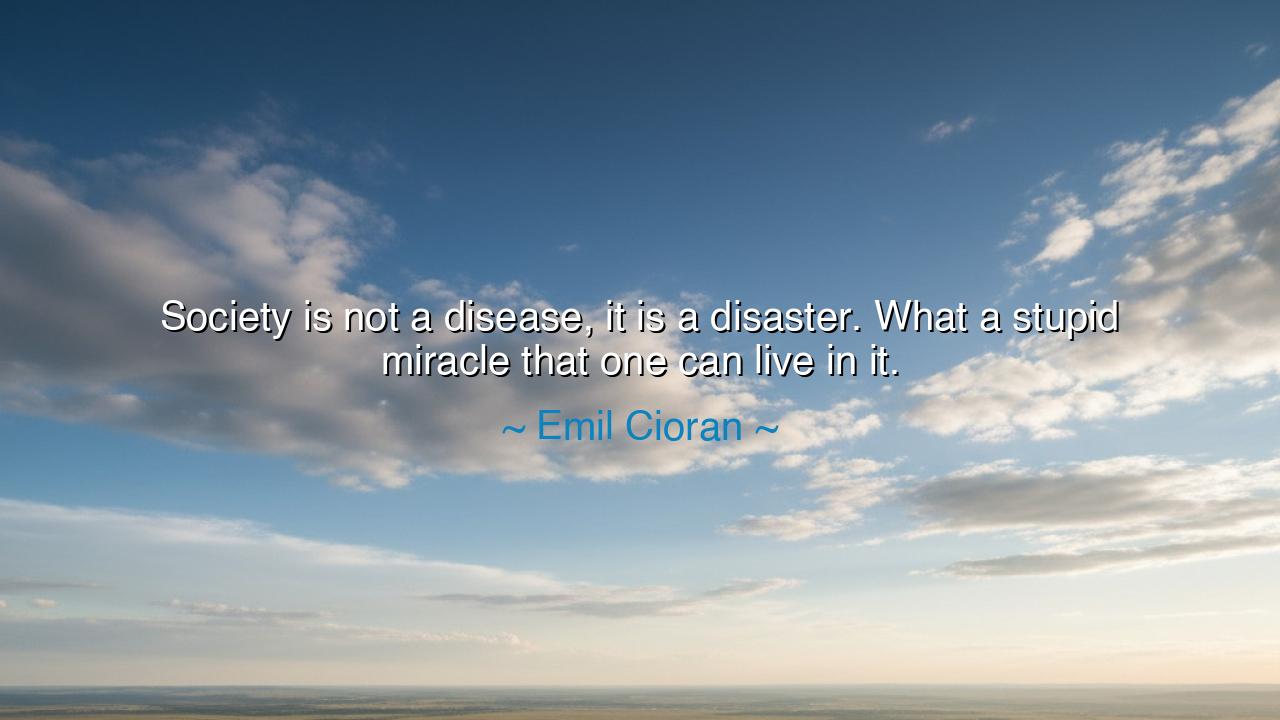
Society is not a disease, it is a disaster. What a stupid miracle
Society is not a disease, it is a disaster. What a stupid miracle that one can live in it.






Hear me, O children, for I bring you the words of Emil Cioran, a philosopher whose thoughts delve into the depths of human existence and the chaos that surrounds it. He said, "Society is not a disease, it is a disaster. What a stupid miracle that one can live in it." These words carry with them a haunting truth, one that strikes at the heart of human experience. Cioran sees society not as something merely flawed or sick, but as a disaster—a system built upon contradictions, struggles, and endless suffering. To live in it, to endure its weight and its contradictions, he sees as a miracle, a strange, incomprehensible feat that goes beyond logic or reason.
What, O children, does it mean to say that society is a disaster? Cioran does not speak lightly of society's failings. He does not merely criticize the actions of its individuals or the flaws in its systems; he sees society as a structure that forces people into endless cycles of suffering, illusion, and strife. Society is a creation of humanity, yes, but it is also a cage—a place where the human spirit is often trapped, constrained by the expectations of others, by rules that are arbitrary, by a culture that demands conformity at the expense of the individual soul. To Cioran, society is not a natural state of being, but a disaster of our own making, a landscape filled with contradictions that demand our sacrifice.
Consider, O children, the ancient Sumerians, who, with their advancements in writing, mathematics, and law, created the first great civilizations. Their society was not unlike ours, in that it was founded on the idea of order—laws to govern, rules to follow, and structures to uphold. And yet, despite their greatness, their society crumbled under the weight of its own contradictions. The rulers, though powerful, were often corrupt, and the people, despite their contributions to civilization, were bound in a system of rigid class divisions. In the end, the Sumerians and other ancient civilizations showed that even the most advanced societies can collapse under the strain of their own limitations, their own disasters. Cioran’s words echo through history, reminding us that no matter how grand our creations may seem, they are always susceptible to decay.
In our own time, O children, we need only look to the endless turmoil that characterizes much of modern life to see the truth of Cioran’s vision. We live in a world of rapid technological advancement, of sprawling cities, of economic power, and yet, the very systems we create often seem to be in a constant state of crisis. Inequality persists, wars rage, and the environment is ravaged by our unrelenting pursuit of progress. Despite all the technological wonders we have achieved, society seems to be teetering on the edge of disaster, facing challenges that no one seems able to fully address. And yet, we persist—living in it, enduring its chaos, finding meaning amidst the madness. Cioran calls this a "stupid miracle," for how can we endure such suffering without breaking? And yet, we do.
Consider the story of Vincent van Gogh, the great artist who lived in a world that did not understand him. Van Gogh created masterpieces, yet his life was filled with suffering, rejection, and solitude. He was a man caught between the brilliance of his vision and the crushing weight of society’s inability to appreciate it. In his letters, he often spoke of his despair, of his need to escape the contradictions of his world. Yet, despite his turmoil, he continued to create. Van Gogh’s story is one of both tragic beauty and enduring spirit, and it is a reflection of Cioran’s idea: to live in a society that stifles, confines, and oppresses, yet to still create, to still seek meaning and purpose amidst the chaos, is both a curse and a miracle.
So, O children, the lesson is this: society is a complex and often destructive force, one that traps the human spirit within its walls. Yet, to live within it is a miracle, for it shows the resilience of the human soul. It speaks of our ability to endure, to find meaning in the midst of suffering, and to create despite the chaos that surrounds us. Cioran challenges us to question the nature of society—to ask whether we are truly free, or merely imprisoned by the very systems we have created. And he challenges us to find our own path, to embrace our individuality even in the face of overwhelming conformity.
Therefore, O children, I charge you: do not simply accept the world as it is, but question it. Reflect on the contradictions and the chaos around you, and recognize that society—as it is currently structured—does not offer the freedom and truth that the human spirit craves. Seek to create a world that nurtures your soul, that frees you from the traps of conformity and oppression. Understand that while society may indeed be a disaster, it is your task to navigate it, to endure its hardships, and to rise above them. In doing so, you will find the true strength of the human spirit, and you will prove that even in the greatest disasters, there is a miracle—the miracle of life and resilience.






AAdministratorAdministrator
Welcome, honored guests. Please leave a comment, we will respond soon